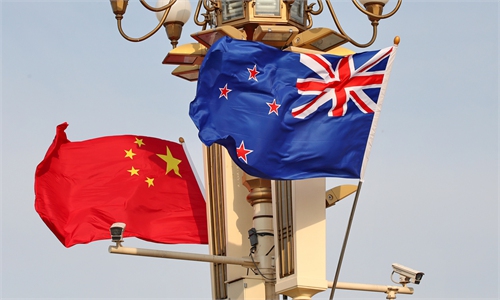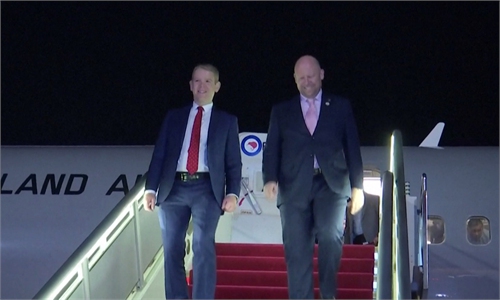
New Zealand's Prime Minister Chris Hipkins speaks to the media during his first official post cabinet press conference at Parliament in Wellington on January 25, 2023. Photo: VCG
The Pacific region is becoming "more contested, less predictable, and less secure" as China becomes more assertive, New Zealand Prime Minister Chris Hipkins said at the China Business Summit in Auckland on Monday.Such words are a bit unexpected from the leader of New Zealand. It's, indeed, a long-standing narrative of countries like the US, Australia, and Japan, which are more aggressive than New Zealand's stance toward China. And it is essentially still a question of how to look at China's power as it grows.
According to these countries, China is becoming assertive as its strength rises, so that any commercial or military move of China is seen as a potential threat to the current regional order. Similarly, New Zealand also holds some of the stereotypes in the West that China is a confrontational and exclusive presence in the South Pacific.
Hipkins had an official visit to China in late June. While in China, he said he cherished the opportunity to have frank and in-depth exchanges with the Chinese side during the trip. Hipkins then headed to the NATO summit in early July.
Against the backdrop of intense China-US tensions, especially as the US is ganging up and provoking bloc confrontation, although China has no such intention, New Zealand is left with less and less room for balance in diplomacy.
"New Zealand is an intimate ally of Australia, and its defense partnership with the US is heating up year by year, which is gradually going back to the level that it was before the 1980s, so New Zealand is actually under the strategic squeeze," Tian Jingling, an associate researcher at China Institute of Contemporary International Relations, told the Global Times.
Smaller countries usually don't have much voice in international relations, except to follow the major trend. For these countries, a more favorable approach is to have their bread buttered on both sides. This requires a high level of diplomatic wisdom. In other words, it can't completely lean to one side; for example, if a country is fully tied to the US side, it is certainly dangerous.
"China doesn't have a tradition of seeking alliance or engaging in alliances. Now for these small and medium-sized countries in the Indo-Pacific, the best way is to take a more flexible and pragmatic path based on their own national interests, rather than joining the bloc confrontation provoked by the US. After all, China's rise is not aimed at threatening other countries, and China has always advocated mutual benefit and win-win cooperation," said Zhang Jie, a researcher at the National Institute of International Strategy of the Chinese Academy of Social Sciences.
As to China-New Zealand relations, the New Zealand prime minister said that "our relationship with China will continue to require careful management," and that "where these perspectives are shared with others, we work together. This is at the heart of our independent foreign policy."
Wellington's approach inherits some of its own characteristics geographically and historically, but it can provide a reference for other countries influenced by traditional dominant powers. One example is the Solomon Islands, which has historically been deeply under the control of Australia, but finally made a political decision based on its own national interests and is now developing more cooperation with China.
What's even more concerning for these South Pacific countries is that this year's global warming is particularly serious. As the sea level rises, these countries are faced with disappearing land, food insecurity and natural disasters. Such realistic challenges are far greater than the so-called great power game, so these countries are more concerned about practical problems. For example, some hope that China and the US can offer more assistance in their response to food supply and climate change, reflecting a more pragmatic attitude.
The relationship between Beijing and Wellington is still stable, but it is necessary to emphasize more pragmatic cooperation, such as economic ties and humanistic exchanges. With such concrete cooperation, both sides will have more room to maneuver. At least, it has to be an approach that is feasible and conducive to the national development of both countries.


